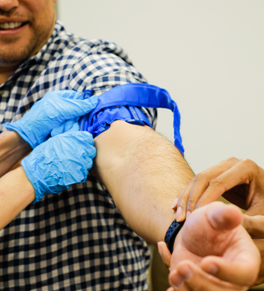Stop-the-Bleed courses save lives

Could you help someone near you who was badly injured and bleeding?
Unfortunately, too few of us know what to do. In observance of National Trauma Awareness Month, UCI Health trauma specialists are educating the community about bleeding prevention with a mix of virtual and in-person Stop-the-Bleed courses and outreach this month.
As of May 2021, the United States has recorded more than 180 mass shootings, more than one a day since the start of the year. The Orange County community witnessed a mass shooting on March 31 in the City of Orange that killed four people, including a child.
Knowing how to save someone’s life by stopping bleeding injuries is invaluable not just in the event of an “active shooter” event or mass casualty situation, but in other situations, like a car crash or an accident at home.
Trauma specialists at UCI Medical Center — Orange County’s only Level I trauma center — teach Stop-the-Bleed classes to prepare people to care for others who may be injured in accidents, falls or shootings.
“We hope to train every Orange County resident and have bleeding control kits in all public areas to help stop unnecessary deaths due to bleeding,” says Dr. Jeffry Nahmias, a UCI Health trauma surgeon who has taught Stop-the-Bleed classes since they began in 2017.
Minutes count
“A person can bleed to death within four minutes,” says Delfa Seto, trauma injury prevention coordinator at UCI Medical Center. “The Stop-the-Bleed class teaches a basic skill any person can acquire. This skill goes beyond the needs of a gunshot wound victim. It can also be helpful while waiting for paramedics to arrive to care for traumatic injuries that can occur at home, at work, in traffic or while camping or hiking.
“The skills taught in Stop-the-bleed can save a life,” says Seto, who has a master’s degree in nursing science and is a certified emergency nurse.
“Trauma is the No. 1 cause of death among people 45 and younger, and uncontrolled bleeding is the leading cause of preventable death in trauma,” says Nahmias. “In our one- to two-hour class, we teach participants how to identify where the hemorrhage is coming from and what they can do to help.”
While torso wounds need immediate surgical attention in a hospital setting, Nahmias says, “For wounds in other parts of the body, we teach the basics of how to control bleeding by applying proper pressure, wound packing and tourniquets.”
Effective tourniquet use
Tourniquets were out of favor for many years, but recent military research has shown they can stem deadly blood loss in an injured person for several hours without causing harm.
If a tourniquet — a band or bandage that can compress blood vessels near the wound — is not available or does not fully stop the bleeding, pack the non-torso wound with a clean cloth and apply pressure with both hands. Use a cloth, shirt, gauze, feminine hygiene pads — whatever is handy — to press into the wound.
Protect yourself from blood-borne infections by wearing gloves, if possible. It’s a good idea to keep a pair of gloves and a tourniquet on hand for such emergencies, whether in your car, backpack, purse or home first-aid kit.
Learn more steps to saving a life with bleeding prevention.
Training options
UCI Health has trained its medical staff and students, as well as firefighters, security guards and other first responders. Boy Scouts and community members have also taken the course, which is open to anyone age 13 and above. There’s an emphasis on training the trainers, so that people with medical backgrounds can qualify to teach Stop-the-Bleed classes to others in the community.
“A variety of courses are taught with the well-being and comfort of the community in mind,” says Seto. “The goal is for training and tourniquets to be available in as many places — both public and private — as possible. In time, we hope to see Stop-the-Bleed kits kept alongside defibrillators.”
UCI Health offers a virtual lecture-only course as well as hybrid or in-person options for groups with at least eight participants.
Stop-the-Bleed classes begin at noon on May 12 and 28. The one-hour courses are free.
Register now at www.ucihealth.org/stopthebleed ›
To schedule a Stop-the-Bleed course at your workplace, contact Seto at dsseto@hs.uci.edu. You can also find courses at Bleeding Control, which is sponsored by the American College of Surgeons.




